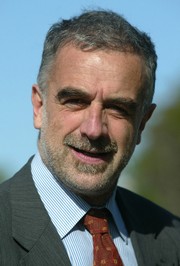In an interview with IRIN, International Criminal Court (ICC) prosecutor Luis Moreno-Ocampo explained the role his organisation is playing to bring to justice those accused of perpetrating atrocities in northern Uganda. Below are excerpts:
QUESTION: How did the ICC become involved in the northern Ugandan conflict, and what is the court's purpose in intervening in the conflict?
ANSWER: The government of Uganda referred the situation in northern Uganda to the ICC in December 2003. The decision to open a formal investigation was taken in July 2004.
The ICC brings an independent and impartial justice component to the collective effort to end the violence in northern Uganda. Focusing on individuals bearing greatest responsibility for the most serious crimes in northern Uganda, the ICC complements local, national and international initiatives to promote justice, reconciliation and reintegration.
Q: Is the ICC investigation limited to war crimes committed by the LRA, or will the Uganda People's Defence Forces also come under scrutiny?
A: The investigation is being carried out in an independent and impartial manner and will include the analysis of all alleged crimes within the jurisdiction of the court committed in northern Uganda. Prosecutions will focus on those individuals bearing [the] greatest responsibility for the crimes.
Q: Several leaders from northern Uganda have voiced strong opposition to the ICC's intervention in the conflict and have visited The Hague to appeal for the investigation to be suspended on the grounds that it is hampering the ongoing peace process. Does the ICC plan to halt its investigations? Could you explain why this is the ICC's position?
A: From the outset of the ICC's involvement in northern Uganda, the court engaged in a process of dialogue with representatives of the affected communities in Uganda, as well as relevant national and international groups. Through this process they and I exchanged views on the ICC, its procedures and policies, gathered information relevant to assessing the interests of the victims for the purpose of the Rome Statute, and coordinated the activities of my office with other efforts to end the violence.
As part of this dialogue, in March and April 2005 I invited community leaders from the Acholi, Lango, Iteso and Madi communities to The Hague. The meetings provided an opportunity to discuss the ICC in detail and focus on the respective contributions of the ICC and the community leaders to ending the violence in northern Uganda.
The meetings highlighted a consensus amongst participants that ending violence in northern Uganda requires a comprehensive and coordinated approach, including: dialogue, justice and reconciliation initiatives, reintegration programmes and reconstruction. [Go to
www.icc-cpi.int for copies of the public statements that followed these meetings.] I will continue the dialogue with the community leaders throughout the ICC's involvement in northern Uganda.
Within this strategy, the ICC is an independent part of the justice component along with traditional justice and reconciliation processes. The combination of these components will ensure the greatest positive impact on the situation in northern Uganda.
Q: If the Ugandan government decided that it no longer required the assistance of the ICC in the conflict and asked the court to withdraw, would the ICC stop its work in the country?
A: The statute does not provide for withdrawal of referrals as such. The office of the prosecutor continues to receive strong cooperation from the government of Uganda as well as other actors in Ugandan civil society. In accordance with the statute, the prosecutor has the power to reconsider a decision to investigate and prosecute in the light of new facts or information.
Q: The Ugandan government has instituted an amnesty law that effectively pardons any rebel who voluntarily surrenders and denounces the conflict. Several leaders of the LRA – including Brig Sam Kolo - have taken advantage of this law. Is the amnesty law counterproductive to the ICC's work in the north? How does it affect the ICC's work?
A: Domestic amnesties are strictly a matter for national authorities and do not act as a bar to an investigation by the ICC. In accordance with the policy and strategy of the office of the prosecutor, the investigation and prosecutions will focus on those limited number of individuals who bear greatest responsibility for committing the most serious crimes within the jurisdiction of the court.
Collective local, national and international efforts will be essential to ensuring that programmes are available for ensuring effective reintegration and reconciliation.
Q: Sudan has been accused of supporting the LRA. Does the ICC have the mandate to investigate these claims? Is it within the ICC's jurisdiction to investigate and prosecute the Sudanese government or individual Sudanese citizens who may be implicated in war crimes in the conflict, especially given that Sudan has not ratified or acceded to the Rome Statute?
A: The ICC has jurisdiction over crimes committed by nationals or in the territory of state parties. If nationals of nonstate parties commit or contribute to crimes committed on the territory of a state party, the ICC may have jurisdiction over these individuals.
« Waiting for elusive peace in the war-ravaged north





